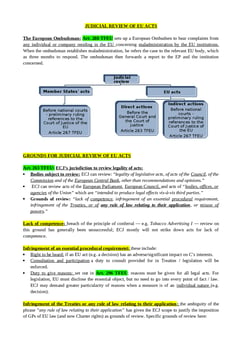Case 66/85 Lawrie-Blum [1986] ECR 2121
Judgement for the case Case 66/85 Lawrie-Blum
Table Of Contents
Plaintiff, a British citizen, had completed the first stage of her teacher qualification in Germany but was refused entry to the second stage (followed by a job at a school) on the grounds that ‘civil service’ posts were reserved for Germans.
Germany tried to argue that this was ok because Plaintiff was not yet a ‘worker,’ but merely training to become a worker, and therefore didn’t come within Article 39.
ECJ rejected this interpreting ‘worker’ broadly to mean that “for a certain period of time one person performed services for and under the direction of another person, in return for which that person received remuneration”, which was satisfied in the present case.
ECJ also denied that Article 39(4) could provide an exemption on the grounds of ‘public service’- see below.
ECJ
Since freedom of movement for workers constitutes one of the fundamental principles of the Community, the term “worker” in article 48 may not be interpreted differently according to the law of each member state but has a Community meaning.
-
In this case a trainee teacher in the preparatory stage the school to which the trainee is attached directs Plaintiff, fixes her hours, etc.
The lessons that the trainee teacher gives can be considered a service of economic value, and the money a trainee is paid can be seen as remuneration.
It is also immaterial whether this service is performed in the public or private sphere.
-
As for Article 39(4), this had to be limited to what was strictly necessary to safeguard the interests of the member states under that provision.
Its application must therefore be restricted to posts which involved direct or indirect participation in the exercise of powers conferred by public law and in the discharge of functions intended to safeguard the general interests of the state or other public authorities.
Could the result be that trainee teachers simply won’t be paid, so as to avoid the free movement question? Depends on national minimum wage legislation’s scope in each country, ability to recruit, etc.
For Further Study on Case 66/85 Lawrie-Blum
Need instant answers? Our AI exam tutor is here to help.
Ask questions 🙋 Get answers 📔 It's simple 👁️👄👁️
Our AI is educated by the highest scoring students across all subjects and schools. Join hundreds of your peers today.
Get StartedSimilar Cases
Related Product Samples
These product samples contain the same concepts we cover in this case.
| European Law | Free Movement Of Persons Notes (29 pages) |

 Since 2010, Oxbridge Notes has been a trusted education marketplace, supplying high-quality materials from top achievers at universities like Oxford, Cambridge, LSE, Harvard, and Yale.
Since 2010, Oxbridge Notes has been a trusted education marketplace, supplying high-quality materials from top achievers at universities like Oxford, Cambridge, LSE, Harvard, and Yale.